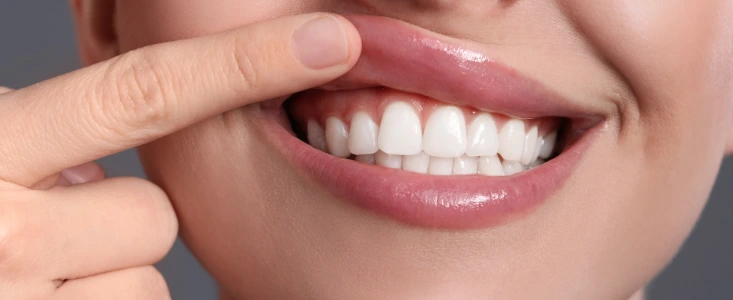The lingering pain from a tight jaw often causes discomfort in other parts of your body like your head, neck, ears, teeth, or face. The pain may also oscillate between throbbing, aching, or severe. Typically, a tight jaw is a culprit of a jaw joint that suddenly locks, clicking noises in your jaw, or a limited range of motion when you try to open your mouth. Tightness in your jaw is not something you should ignore. In many cases, there are at-home remedies to reduce the pain and preventative measures you can take. However, a tight jaw may indicate a deeper problem that your dentist can address. Our team at Anderson & Atkins, DDS has answered the following questions to help you better understand the causes, remedies, and prevention tactics of a tight jaw.
What causes a tight jaw?
There are several reasons you may experience a tight jaw. If you have questions about any of the following causes of jaw discomfort, contact our office today.
1. Temporomandibular Joint Disorders (TMD)
When the hinge joints of your jaw lock or are uncomfortable, TMD may be to blame. TMD also leads to feelings of tenderness or throbbing pain in your jaw while chewing or talking.
2. Stress
Many people tend to clench their jaw or hold tension in their jaw while under stress or anxiety. You can clench your jaw unknowingly while awake or asleep and only notice it when pain erupts from a tight jaw.
3. Teeth Grinding
Teeth grinding, or bruxism, often happens while you are sleeping. It can occur as a result of stress, genetics, or dental problems. Bruxism can lead to tightness in your jaw, headaches, earaches, or soreness in your face or neck.
4. Excessive Chewing
You may experience the sensation of a tight jaw if you chew gum, or another substance, regularly.
5. Rheumatoid Arthritis
Rheumatoid Arthritis (RA) is an autoimmune inflammatory disorder that affects muscles and joints in your entire body. Those diagnosed with RA often experience TMD, bone loss in the jaw, or damage in the jaw joint and surrounding tissues.
How can I relieve the pain associated with a tight jaw?
There are many ways you can reduce the tightness of your jaw—most can be done from the comfort of your own home. In some cases, you’ll want to schedule an appointment with your dentist to address a bigger problem.
1. Stretch Your Jaw
You can stretch the muscles in your jaw and your jaw joint by trying a few simple exercises. One, place your fingers on the top of your front four bottom teeth. Slowly pull down, hold for 30 seconds, and then slowly release your jaw. Repeat several times to reduce the tension in your jaw. Two, slowly open your mouth as wide as you can and then gently close your mouth. Repeat up to 10 times to eliminate tension in your jaw and neck. Three, smile as wide as you can without feeling pain. While smiling, slightly open your jaw and inhale deeply. Exhale as you release your smile. Repeat multiple times to help relieve pain in your facial muscles and upper and lower jaw. It’s important to note that you should stop these exercises if you experience any pain.
2. Massage Your Jaw
You can increase the blood flow and reduce the tension in your jaw by gently massaging the muscles next to your ears. Open your mouth and rub the muscles in a circular motion multiple times a day.
3. Use a Mouthguard
A mouthguard can protect your teeth from grinding while you sleep. This prevents wear and tear on your teeth and jaw tightness. At Anderson & Atkins Dentistry, we can provide a custom mouthguard that is comfortable and effective.
4. Quick, Temporary Relief Tactics
You can apply a hot or cold compress to your jaw to temporarily relieve pain or take an over-the-counter pain reliever to reduce inflammation. While this provides quick relief, it is only temporary. If you continually experience a tight jaw, you may want to take preventative measures.
How can I prevent a tight jaw?
Preventing a tight jaw is possible. By making a few simple adjustments to your life, you can reduce two of the most common causes of a tight jaw.
1. Reduce Stress and Anxiety
Practice deep breathing exercises throughout the day to reduce the tension in your body brought on by stress. Low impact aerobic exercises like swimming, walking, and dancing are also ways to improve your overall physical and mental health. Adding yoga or meditation to your daily routine can also minimize feelings of stress and anxiety and prevent your jaw from getting tight.
2. Avoid Overuse of Your Jaw Muscles
Removing certain foods from your diet can prevent you from overusing your jaw muscles. Foods like steak, taffy, raw carrots, and nuts often require excessive amounts of chewing. Instead, try foods that are softer or less sticky. You may also consider a sugar-free mint rather than chewing gum between meals.
If these at-home remedies don’t relieve the pain or tension in your jaw, call Atkins & Anderson, DDS today.
Share
STAY IN THE LOOP
Subscribe to our free newsletter.
Leave A Comment
Healthy gums are the foundation for a healthy smile because they support and protect your teeth. That’s why gum health is essential for a bright and beautiful smile. Here are some six tips to help keep your gums (and smile!) healthy. Brush Your Teeth Twice a Day Brushing your teeth twice daily is crucial for
Helping your child develop the healthy habit of brushing their teeth can be challenging. Boredom is one of the main reasons kids push back against brushing their teeth, so why not find a way to make the process fun? Here are four tips to encourage your kids to brush their teeth. Sing a Song or





